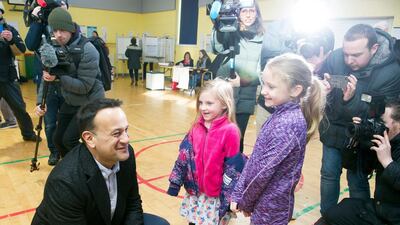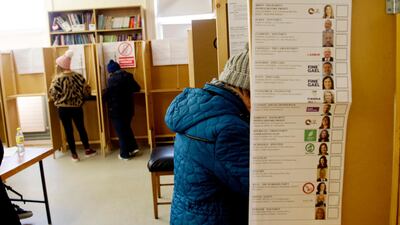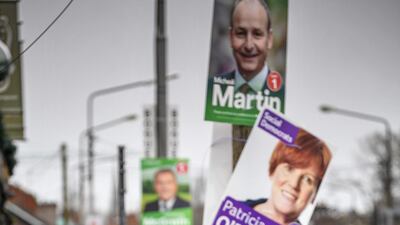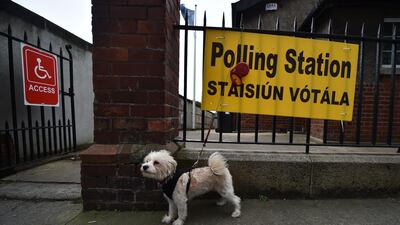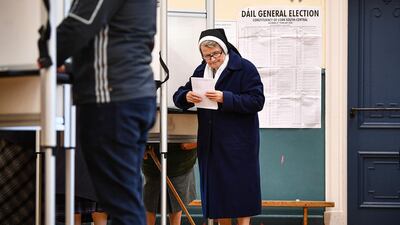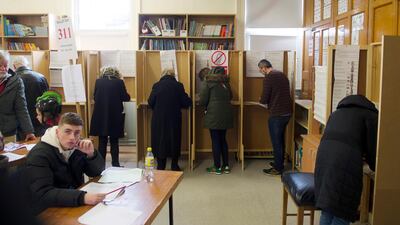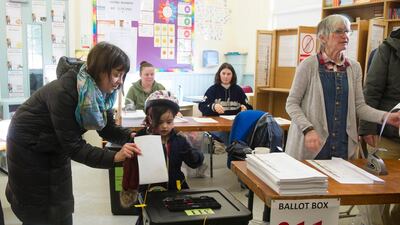Ireland’s three biggest parties are neck and neck following Saturday’s general election, an exit poll indicates, leaving the battle to lead the next government too close to call.
Taoiseach (prime minister) Leo Varadkar’s incumbent Fine Gael party, centre-right rivals Fianna Fáil and left-wingers Sinn Féin all received 22 per cent of first-preference votes, according to the PSOS MRBI poll issued as the polling stations closed at 10pm GMT.
The survey of about 5,000 voters leaving the polls – which has an estimated margin of error of 1.3 per cent – put Fine Gael on 22.4 per cent, Sinn Féin on 22.3 per cent and Fianna Fáil on 22.2 per cent.
The Republic of Ireland uses a single transferable vote system to elect deputies from each of the 39 constituencies, making it hard to extrapolate a seat forecast from the exit poll figures for first-preference votes.
The count gets under way at 1pm UAE time on Sunday.
"We've never seen a general election result like it," said Pat Leahy, political editor of The Irish Times newspaper.
“Basically, a statistical tie between what are now the three big parties. Government formation is going to be a very difficult exercise indeed if the parties maintain their pre-election positions,” he told RTE television.
Both Fine Gael and Fianna Fáil, which have traditionally held a duopoly on power, pledged they would not form a coalition with Sinn Féin.
However, this stance divided voters with exit polls suggesting that 68 per cent to 30 per cent of 18-24 year olds thought this was wrong over right, and those over the age of 65 saw a 38 per cent to 58 per cent wrong to right split.
Regionally, 61 per cent to 39 per cent wrong to right split in the western province of Connacht and northern province of Ulster (excluding the British administered 6 counties of Northern Ireland).
In Dublin, 55 per cent to 40 per cent thought this was wrong to right and 49 per cent to 44 per cent thought this was wrong to right split in the rest of the province of Leinster.
In the southern province of Munster, a 43 per cent to 55 per cent wrong to right split stood out.
Mr Varadkar's attempt to frame the election around Brexit appears to have failed, after just 1 per cent of exit poll respondents saying this was a factor in how they voted.
Instead 58 per cent of people's concerns were health (32 per cent) or housing/homelessness (26 per cent) with health being the most influential factor across almost all age groups and regions, with 43 per cent of people over the age of 65 in particular saying it decided how they voted.
Asked if they have benefited from an economic recovery and given three options on how to respond, 63 per cent of those who took part in the exit poll said "this does not apply to me personally."
When voters were asked if they want a border poll (referendum on reunification with Northern Ireland) to take place at some stage in the next five years, 57 per cent said they would like to see this while 40 per cent said they would not like a poll by 2025.
Given the predicted close nature of the general election result, the exit poll indicators are likely to put fresh pressure on incumbent Taoiseach Leo Varadkar and opposition leader Micheál Martin to consider Sinn Féin as a viable coalition option.
Sinn Féin has only played a minor role in the Republic's political landscape since the 1920s but is the largest political party on the island of Ireland, when incorporating the party in the 6 county British jurisdiction known as Northern Ireland, where it is part of a devolved government.
The party was founded in 1905. Splits from the party led to the creation of Fine Gael and Fianna Fáil in the 1920s and into the 1930s.
It garnered an entire new life from the 1970s in British administered Northern Ireland, where it is historically associated with the Provisional Irish Republican Army, a paramilitary group.
